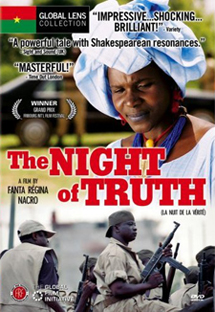|
Reviews of Recent Independent, Foreign, & Documentary Films in Theaters and DVD/Home Video
Directed by: Fanta Régina Nacro. Produced by: Claire-Agnès Lajaoumard & Nacro. Written by: Marc Gautron. Director of Photography: Nara Keo Kosal. Edited by: Andrée Devanture. Music by: Troupe Nada Yaadega & Sami Rama. Released by: First Run Features. Language: French, Mooré & Dioula with English subtitles. Country of Origin: Burkina Faso. 100 min. Not Rated. With: Adama Ouédraougo, Commandant Moussa Cissé, Naky Sy Savane, Rasmané Ouédraougo & Georgette Paré. DVD Features: Discussion guide which includes film notes, director’s statement, Africa in context & resources. Trailers.
As a gesture of reconciliation, the Nayak president agrees to meet the rebel leader of the Bonandés, bringing his wife and officers to a feast of braised snake and roasted caterpillar at the Bonandés’ village. However, all the men, on both sides, carry their weapons to the festivities, moving the rebel leader’s wife, Soumari (Georgette Paré), to plead for everyone to put their weapons away, just for that night. She has already ordered musicians not to beat the drums, which could be construed as a call to arms. Her role as a maternal peacekeeper follows suit with other female role models, like in 2006’s Grbavica, which deals with the aftermath of the Bosnian civil war. But daringly, Nacro casts the other female lead character, Edna (Naky Sy Savane), the wife of the president, in a completely different mode. Terrified she’s being led to slaughter, her husband orders her to attend. Gracious to a fault, she even befriends Soumari’s beautiful children. However, Edna’ hatred overwhelms her after she hears a rather freely offered confession concerning the murder of her son. She maniacally transforms into someone like the wife of Macbeth, except it is not her guilt driving her off the deep end but her hatred.
There are two other departures which could be seen as politically incorrect or incendiary, where an African would be more at liberty to portray
as opposed to a Westerner. One is the buffoonish cook Tomoto (Rasmané Ouédraougo), Edna’s counterpart among the Bonandés, whose minstrel-like antics incite distrust of the Nayaks. It’s his belligerent actions that disturb Edna. And as regards to violence, Nacro gruesomely and luridly depicts the atrocities committed by the Bonandés, leaving little to the imagination.
Kent Turner
|

